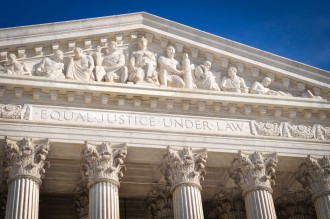
February 27, 2017
SCOTUS to Weigh In on Two Biosimilar Provisions of the BPCIA in 2017
2017 is shaping up to be a big year for biosimilars and for the Biologics Price Competition and Innovation Act of 2009 (BPCIA) specifically. The Supreme Court is scheduled to hear oral arguments on April 26, 2017, that will have an impact on the detailed process for addressing patent disputes surrounding biosimilar products, as laid out in 42 U.S.C. § 262(l). The first issue involves the commercial marketing notice provision. The second issue concerns whether a biosimilar applicant is required by the BPCIA to provide the reference product sponsor (RPS) with a copy of its biologics license application and related manufacturing information. More details follow below:
1) Sandoz v. Amgen: Sandoz’s 16 Feb 2016 Petition from the July 2015 Federal Circuit ruling in Amgen v. Sandoz is the first time SCOTUS has been asked to take up an issue raised by the text of the BPCIA.
The provision at issue states a biosimilar Applicant (i.e. the subsection (k) Applicant) shall provide notice to the RPS “not later than 180 days before the date of the first commercial marketing of the biological product licensed under subsection (k).” 42 U.S.C. § 262(l)(8)(A) (emphasis added.) The Federal Circuit concluded that a biosimilar Applicant “may only give effective notice of commercial marketing after the FDA has licensed its product” (emphasis added). Does this give the RPS a windfall of 180 days “exclusivity?” Sandoz thinks so and therefore, Sandoz’s Petition asks SCOTUS the following question:
Whether notice of commercial marketing given before FDA approval can be effective and whether, in any event, treating Section 262(l)(8)(A) as a standalone requirement and creating an injunctive remedy that delays all biosimilars by 180 days after approval is improper.
Needless to say, the resolution of the BPCIA’s 180-day notice of commercial marketing provision is important as an additional 180 days of “exclusivity” could have a dramatic effect on the biosimilars industry.
2) Amgen v. Sandoz: Additionally, Amgen filed a Conditional Cross-Petition on 21 Mar 2016 from the same July 2015 Federal Circuit ruling.
The provision at issue states a biosimilar Applicant “shall provide to the RPS a copy of the application submitted to the Secretary under subsection (k), and such other information that describes the process or processes used to manufacture the biological product that is the subject of such application…” not later than 20 days after the Secretary notifies the biosimilar Applicant that their application has been accepted for review. 42 U.S.C. § 262(l)(2)(A) (emphasis added). Despite the “shall,” the Federal Circuit concluded that a biosimilar Applicant is not required to provide that information to the RPS and that a court cannot compel a biosimilar Applicant to provide that information. Therefore, Amgen’s Petition asks SCOTUS the following question:
Is an Applicant required by 42 U.S.C.§ 262(l)(2)(A) to provide the RPS with a copy of its biologics license application and related manufacturing information, which the statute says the Applicant “shall provide,” and, where an Applicant fails to provide that required information, is the RPS’s sole recourse to commence a declaratory-judgment action under 42 U.S.C. § 262(l)(9)(C) and/or a patent-infringement action under 35 U.S.C. § 271(e)(2)(C)(ii)?
It will be interesting to see exactly what information SCOTUS decides a biosimilar Applicant who has opted to join the patent dance must share with the RPS, and who else is allowed to review the information.



































